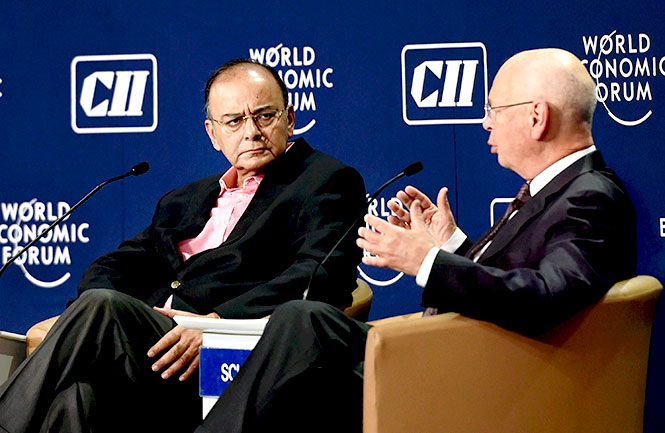New Delhi: India is open to privatisation of certain loss-making state-owned companies, finance minister Arun Jaitley said on Wednesday, promising more initiatives soon including reforms in the mineral sector along the lines of the recently announced coal block auction plans.
The government also plans to open railways further to private investment, ease restrictive land purchase rules, relax labour laws and raise the foreign investment ceiling for insurance companies, Jaitley said.
“Certainly I would be interested to look at some PSUs (which) could do much better in private hands,” Jaitley told delegates at the India Economic Summit organised by the World Economic Forum and industry body Confederation of Indian Industry (CII) in the Capital.
“Taxpayers cannot continue to pay for loss-making businesses,” said Jaitley hinting that the government may consider privatising some of the loss-making state-owned government firms in the future.
For now, however, the government will stick to selling minority stake in profit-making public sector companies.
In September, the government had approved share-sale plans in three major state-owned companies — Coal India Limited, NHPC and ONGC — that can potentially earn the exchequer Rs. 44,000 crore.
Revenues from selling shares in state-owned companies is critical to the government’s plans to keep the fiscal deficit — shorthand for the amount of money the government borrows to fund its expenses — at 4.1% of GDP in 2014-15.
The minister had announced in Rajya Sabha in July that four PSUs would have to be shut down as they were “incapable of revival”.
As many as 79 PSUs have, over a period of time, become loss making and the total amount of public investment stuck in these PSUs was to the tune of Rs. 1.57 lakh crore, he had said, adding “over Rs. 10,000 crore from the budget have been physically pumped into to make them going.”
The government has set an ambitious target of Rs. 43,425 crore to be mopped up from PSU disinvestment in the current fiscal.
Fair business environment
Jaitley said that some allegations of “crony capitalism” were true under the last government and an element of fairness in the system was lacking, such as in the case of allocation coal blocks.
Committing to more reforms and eliminating corruption, Jaitley also said steps taken by the National Democratic Alliance (NDA) government were aimed at creating fair and transparent business environment and ending crony capitalism.
Last month, the government had announced plans to put up coal mines for bidding by private steel, power and cement companies and introduce changes in the law to enable commercial mining in the future, signalling its intent to fully open the sector to private players.
The new auction-based system will replace the earlier controversial policy of allotting coal blocks based on recommendations of a panel of bureaucrats, which the Supreme Court had struck down as arbitrary. The apex court had cancelled 214 blocks allotted since 1993, a move that threatened a nascent economic recovery.
“We are going to take similar steps with regard to other minerals,” he said.
“When we take these steps to eliminate crony capitalism, investors will get a system that is fair and not where they have to depend on the largesse of politicians.”
Over the last five months, the Narendra Modi-led government has unveiled string of measures to turn India into a manufacturing powerhouse, remove bureaucratic sloth, make the country more investor friendly and aid its economic recovery.
The finance minister assured investors more reforms in the coming months, including plans to ease rules for industry to buy land to set up factories.
“We need to pursue one positive direction. Reforms are not about one sensational idea.”
“I am quite satisfied with the beginning that we have made…in the next few months … I think the effects within the country would also start showing.”
Admitting there were challenges, the minister said, the country needed to doggedly pursue the reforms agenda.
“There are bound to be some hurdles, one need not get unnecessarily upset about them. There are a lot within the present political framework and the government’s framework that can be done…but one thing that is clearly borne in mind is that no steps should be taken that sends contrary signals.
“Therefore with all kinds of ideas, big and small, one has to pursue in one direction and that’s what the present government is trying to do and I am quite certain that its only a matter of time that the ground results start reflecting on the cumulative effects of these steps,” he added. ?
“People are now getting convinced that India is a place to invest in.”
Criticising the previous United Progressive Alliance (UPA) government’s move to introduce retrospective taxation, Jaitley said: “Retrospective tax was a bad idea which damaged the economy.”
Jaitley’s statements came on a day the Bombay Stock Exchange (BSE) Sensex breached the 28,000-mark for the first time.
On India blocking the trade facilitation agreement at the World Trade Organization, Jaitley said the government is not opposed to the pact.
“This appears so because of the unreasonable positioning by some developed countries,” he said.
All India is asking for is the “peace clause” on food subsidies to continue till a permanent settlement on the issue is found.

